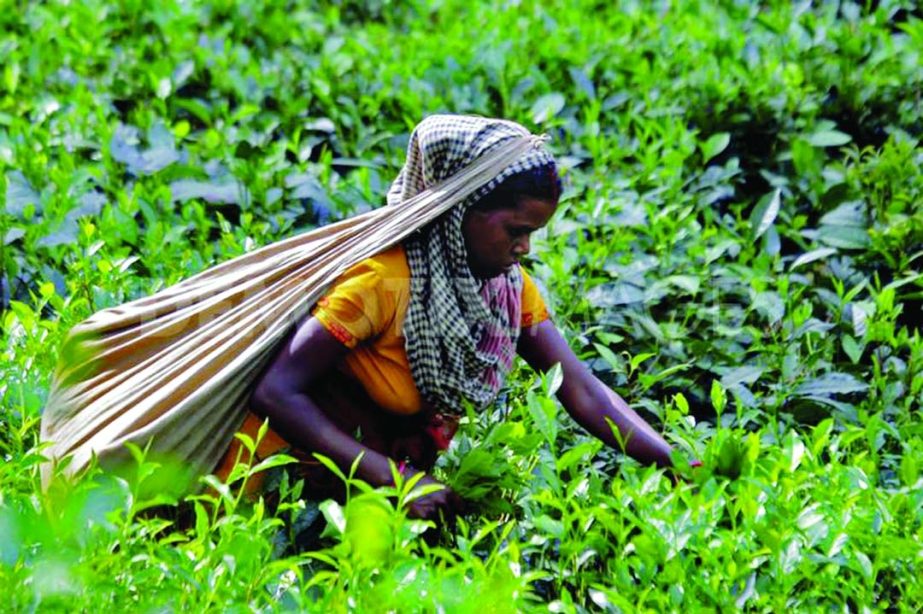
BSS, Dhaka :
Due to lack of proper healthcare facilities, female and child workers of Tentulia Tea Company, a tea processing unit in Panchagarh, are exposed to malnutrition and other health hazards.
Tentulia Tea Company situated at Buraburi of northern Panchgarh district is the first ever tea company of the region where many female workers beside their male counterparts and children are engaged in tea processing works to earn bread and butter for their family members.
Among those, Anwara and Rokeya, two tea workers from Madurpara of Panchagarh, have been working in the company since long. They live in abject poverty and various health hazards.
Their ill health and gloomy appearances depict how they are passing days fighting financial insolvency and various health problems.
Female and child labourers have been working in tea plantation, preparing tea garden, cleaning weeds and plucking tea leaves for processing.
Usually, more female workers are working in tea companies than that of their male counterparts. The reason behind more female workers’ involvement in the profession may be low payment and types of work.
Sajedul Islam Saju, Manager of Nahid Tea Estate, stated that the number of female and children workers in tea company is more than 60 percent of the total workers and rest 40 percent are male.
Among the 60 percent, at least 15 percent are children who are deprived of education and healthcare services.
Tea plantation in the country’s northern Panchagarh district began in the year 2000 whereas the history of tea plantation in the neighbouring Indian state of Assam and Darjeeling is hundred years old.
So the business in India has got an institutional shape. As a result, human rights violation in Indian tea estates is minimal as trade unionism is allowed there to protect workers right.
Since trade union is active there, there is no major report of human rights violation and exploitation of workers. Above all, there are many safety net programs there to ensure welfare of tea workers.
Tea industry in Bangladesh is not well organized although tea cultivation in the country is being considered as the rapidly growing sector. So, relations between owners and workers did not stand on a solid foundation.
Currently, some reputed companies are coming forward to invest in the sector in Panchagarh considering their high prospect in future.
But, female workers in tea estates in Bangladesh have been facing major disparities due to lower payment than that of their male counterparts. Children’s payment is also lower than the female workers.
An apparently disappointed female worker, Rahela Begum, who used to work in a tea estate, expressed dismay over the wage stricture.
“We are getting much lower payment than male workers although we both work the same,” he said describing it as an longstanding problem that should be addressed for the sake of development of the prospective tea sector.
When this correspondent proceeded towards other female and child workers to know the actual figure of payment they declined to make any comments fearing punishment from the owners including losing their jobs.
Tentulia Upazila Medical Dr. Pitambar Roy said no steps have been taken so far to raise nutrition level of the tea garden labourers although the government has taken measurers in this regard in the upazila through community clinics.
When asked owner of Noman Tea Garden and Agro and Cattle Industry Noman Ahmed said it was not possible yet to provide healthcare services to the tea garden workers as few tea estates were set up primarily in Panchagar. “We will certainly take necessary steps to this end in the near future if the business flourishes in the region,” he added.
According to Statistics, 45 percent of the country’s total population is children while the number of children who are living under abject poverty are 78 lakh in Bangladesh.
Besides, the country has 67.84 lakh child workers engaged in different hazardous works. They are deprived of education and health services.
Like the children, female workers are also deprived of their rights in every sector especially those who are working in tea processing units and tea gardens.
Although the tea garden owners in Panchagarh did not take any measurers to provide healthcare services for their workers, the government and the Non-Government Organizations (NGOs) should take the issue seriously and stand beside the poor tea workers with health care services, said the tea workers.
The female workers and the children would be highly benefited if the government take the matter into cognizance and take appropriate measures.

